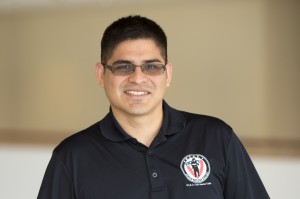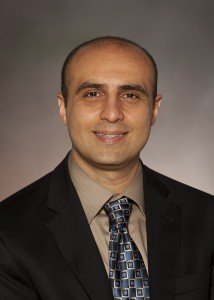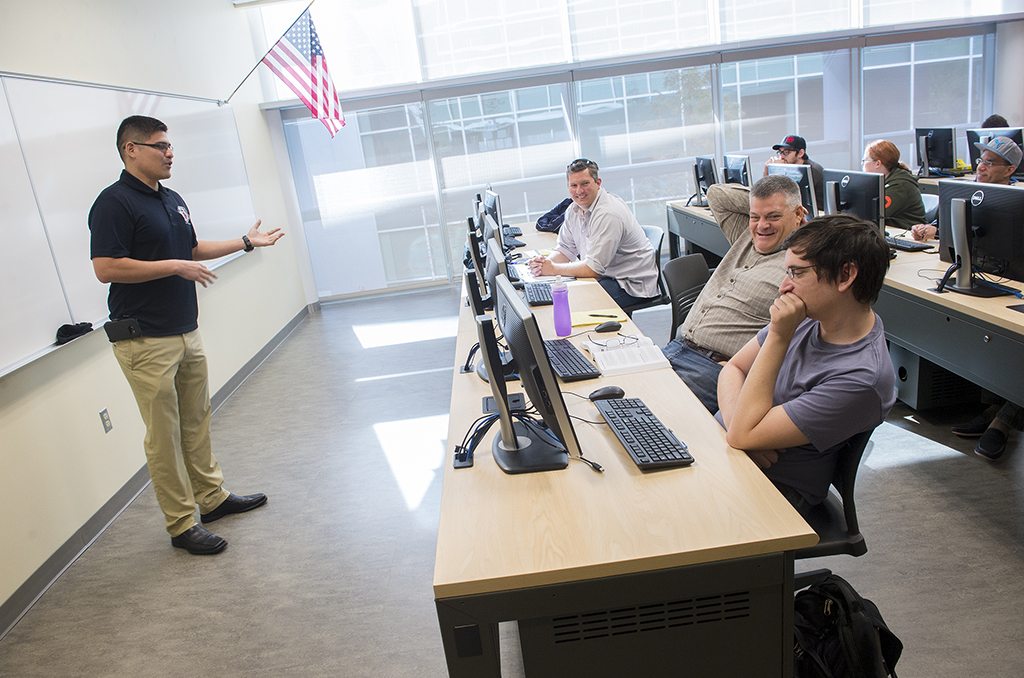Geovanny Perez has always wanted to protect others. That’s why he worked as a lifeguard at Disney resort hotel for several years – and why he enlisted in the U.S. Army in 2010.
And that’s why the former veteran is now studying cybersecurity at Valencia College – and is interning as a digital forensics analyst at the Tampa office of the U.S. Immigration and Customs Enforcement (ICE) agency, where he assists in tracking down child pornographers.
“It’s a good training program,” says Perez, now 33.

Perez, who’s originally from Ecuador, always wanted to attend Valencia College, but didn’t have the money when he immigrated to the United States at the age of 21. So he worked as a lifeguard at Disney for several years, and enlisted in the Army in 2010. After basic training, Perez was sent to Germany for six months and then to Afghanistan for a year. While in Afghanistan, his infantry patrol spent two weeks out of every eight weeks patrolling a road used by the Taliban to smuggle goods to and from Pakistan.
He then returned to the U.S., heading to Fort Campbell in Kentucky. There, however, he experienced a career-ending leg injury and was medically discharged in 2013.
Uncertain what to do next, Perez returned to his old job, lifeguarding at Disney. But it soon became clear that the old job didn’t hold much satisfaction. He still wanted to serve people, but he didn’t know how.
That’s when a friend told him about Valencia’s program in cybersecurity. Intrigued, Perez decided to take a few classes and see if he liked the field. But it didn’t take long — after only a handful of classes — for Perez to land his first internship, a volunteer internship with Immigration and Customs Enforcement.
Until he got the internship, he’d been debating which career track to study at Valencia – debating between cybersecurity (which entails protecting companies’ networks from hackers) or digital forensics. But at the ICE offices, his primary duties involved computer forensics – using computers’ hardware and software like a detective to track criminals. And soon he was hooked on forensics.
The internship wasn’t paid – and it required him to drive to ICE’s Tampa office every day. But Perez wanted to work in the Tampa office so that he could learn from several experienced mentors, including Special Agent/Computer Forensic Analyst Steve Towe and Senior Special Agent Kevin Power, who has been working in the field for 18 years.
For Perez, it’s been a great experience — and one that his Valencia instructors encourage others to try. “It’s a good program that gives you great real-world experience and gives you a leg up on others applying for jobs – especially with (the Department of Homeland Security),” said Valencia adjunct professor Doug Rehman.
Several Valencia students have landed federal government jobs after earning their A.S. degrees in cybersecurity at the college. “I think our students compete with a student who has a bachelor’s or master’s degree,” said Dr. Wael Yousif, professor of network engineering technology and director of Valencia’s cybersecurity program. “They’re interviewing our students and they ask me about background checks, so I know our students are being considered for federal jobs.”
Students who want to advance in the field, however, should eventually pursue a four-year degree, Yousif says. Valencia — which is recognized by the federal government as a National Center of Academic Excellence in Information Assurance — is currently working on an articulation agreement with UCF and plans to create a 2+2+2 program, leading to a master’s degree in digital forensics.

At this point, however students with an A.S. degree can get a job as a forensics analyst or an information security professional with the federal government. From there, they’ll learn much of what they need on the job, Yousif says. “There’s no school teaching this kind of on-the-job training,” he added.
Indeed, after his first Homeland Security internship, Perez applied for and was accepted into a new program created by ICE, Homeland Security Investigations and U.S. Special Operations Command, in conjunction with the National Association to Protect Children. The HERO Corps (Human Exploitation Rescue Operative Child Rescue Corps) retrains wounded veterans to assist federal agents in the fight against online child sexual exploitation. The vets accepted into the program receive free training with all their expenses paid by a nonprofit veterans group – and, after they complete the program, they have the experience to apply for careers with federal, state and local police agencies in the field of computer forensics.
During his HERO training, Perez completed eight weeks of training in computer forensic analysis and digital evidence collection at Homeland Security’s Cyber Crimes Center in Fairfax, Va., to help identify and rescue child victims of sexual abuse and online sexual exploitation. At the end of the eight weeks, he earned certifications in CompTIA A+, Access Data Certified Examiners (ACE) and EnCase.
He and other HEROs also attended three weeks of intensive training where they learned about child exploitation cases and the federal and state criminal laws they will be helping to enforce.
Now Perez is back in Orlando – and commuting to Tampa every day as part of another 10-month internship at the Tampa ICE offices. He hopes this experience will pay off with a job offer when he completes his A.S. degree this summer.
Having been approved for a security clearance, Perez can do more hands-on work, going on raids and examining evidence. “I’m learning how to write reports, document emails, pictures and videos,” says Perez.
Although the internship is unpaid, Perez thinks the sacrifices he’s making now will pay off soon. His supervisors in Tampa like his work ethic and are keeping their eyes open for an upcoming job for him. Though there are no guarantees that he’ll land a job with the federal government after graduation, Perez feels good about his chances to work with federal, state or local police agencies in computer forensics.
“The first internship opened doors for me to other paid internships,” says Perez. “To me, it has been worth it.
“Besides, I’m good with putting bad guys away,” he says with a smile.
